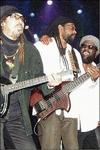
File
Stephen 'Cat' Coore (left), Richard Daley (centre) and William 'Bunny Rugs' Clarke, of Third World.
Mel Cooke, Freelance Writer
St. Thomas has the dubious distinction of often being dismissed as the forgotten parish, popping up in the national consciousness when the Yallahs Ford is impassable. But, for those who are into reggae and one of its most durable and outstanding exponents, the band, Third World, it has a significance (whether they know it or not) connected to the year events in the parish led to a legendary trek, a rebellion, a massacre, hangings, and two of Jamaica's National Heroes.
The year was 1865. The trek was from Stony Gut to Spanish Town, and back. ("Excellency, before you I come with my representation, you know where I'm coming from.") The rebellion was around the Morant Bay Courthouse. The massacre was of over 400 black people by soldiers, less than three decades after Emancipation. The hangings were of over 350 more. ("You caught me on the loose, fighting to be free, show me your noose under cotton tree, entertainment for you, martyrdom for me.") The two heroes are Paul Bogle and George William Gordon, who live forever in the public memory. ("Some may suffer and some may burn, but I know that one day my people will learn, as sure as the sun shines, way up in the sky, today I stand here a victim the truth is I'll never die.")
And it was real hot, some "ninety-six degrees in the shade, ten thousand soldiers on parade".
Stand-out song
The song is 1865' (96 Degrees in The Shade), the title track of Third World's second album, released in 1977, and which remains a stand-out song, 30 years later.
For Third World lead singer, William 'Bunny Rugs' Clarke, it was his first full-length studio set with the band. And, considering that it was written to record a massacre and summary executions with not much by way of trial by a colonial regime of its innocent subjects, the place where it was written was delightfully ironic.
"That tune was written in the rehearsal room of Vale Royal (now official residence of the Jamaican Prime Minister). That time Cat Coore's (Third World guitarist and cellist) father was Minister of Finance and Deputy Prime Minister, so we used the facilities to play football and rehearse," Rugs tells The Sunday Gleaner.
"In th of the colonial building you write a song about a man who was hanged by the colonial powers?" he muses.
1865 (96 Degrees in the Shade) was a collaborative effort and Clarke says, "Songs used to come out of us jamming. Ibo (Cooper, former Third World member) start play something, Willie (Stewart, former drummer) start play something, and somehow the subject matter find its way," Rugs says.
"It was not planned, it just happened," he says. As such, he says the song is credited to "Cooper, Coore, Clarke, Daley, Stewart and Jarrett", all six band members at the time.
Creating a hit
"Once the concept was realised, we started to focus on the seriousness of what we really going to say about the incident that happened, how serious it was. We could not deal with it like it was another song. It did not turn out as just another song," Rugs says.
"There was not much delay between writing and recording the song," he says, "it was a couple weeks after. We started it at Harry J, then we finished it in England at Chris Blackwell's studio. We fished the entire album up there."
That outstanding album also contains Jah Glory, a cover of Dreamland, Feel a Little Better, Human Marketplace and Rhythm of Life.
There is no doubt, though, that the title track earned its status on a stellar set. "96 Degrees is probably one of the most popular Third World tunes," Rugs says, "that is one song that we never ever leave out of the set. We can leave out Sense of Purpose, Try Jah Love, Cool Meditation, but you can't leave out 96 Degrees in the Shade.
"Anywhere in the world you go you play it. People ask for it."
For Rugs, one of the more outstanding occasions when Third World played 1865 at the university in Abba, Nigeria, in 1982, as "the people went nuts".
And the story behind the song has not been lost, as Rugs says not only are band members asked about it in interviews, but at concerts people thank them for playing the song, and then speak about the massacre in Morant Bay.

